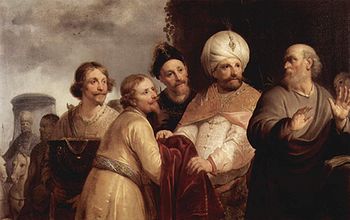- Naaman
-
- Naaman is also the name of one of the Minor characters in the Book of Kings
Naaman (נַעֲמָן "pleasantness") was a commander of the armies of Ben-Hadad II in the time of Joram, king of Israel. He is mentioned in 2 Kings 5 of the Tanakh. According to the narrative, he was afflicted with tzaraath.[1] When the Hebrew slave-girl who waits on his wife tells her of a prophet in Samaria who can cure her master, he obtains a letter from Benhadad to Joram in which the former asks Joram to arrange for the healing of his subject Naaman. Naaman proceeds with the letter to Joram. The king of Israel suspects in this — to him — impossible request a pretext of Syria for later starting a war against him, and tears his clothes. When the prophet Elisha hears about this, he sends for Naaman. But rather than personally receiving Naaman when the latter arrives at Elisha's house, Elisha merely sends a messenger to the door who tells Naaman to cure his Leprosy by dipping himself seven times in the Jordan River. Naaman, who had expected the prophet himself to come out to him and perform some kind of impressive ritual magic, angrily refuses, and prepares to go home unhealed. Only after Naaman's slaves suggest to their master that he has nothing to lose by at least giving it a try, he does as told and finds himself healed. Naaman returns to Elisha with lavish gifts, which Elisha flatly refuses to accept. Naaman also renounces his former god Rimmon after being cured by Elisha and accepts the God of Israel.[2]
Naaman is also mentioned in Luke 4:27 of the New Testament as an example for the will of God to save people who are considered by men as less than pious and unworthy of salvation. As the Septuagint, the Greek Old Testament, uses the word baptizein for the dipping that heals the heathen Naaman, which also takes place in the Jordan River where Jesus Christ himself was baptized many centuries later, Christians have often interpreted the Naaman story as prefiguring the Christian baptism of the heathen nations.
See also
References
- ^ Often translated as leprosy, this illness or affliction, was not today's leprosy. Leprosy as known today did not come to Ancient Israel until Alexander came back from a trip to India in the mid 300s BC.
- ^ God Loves Naaman Word Journey, August 29, 2008. Retrieved September 7, 2008.
- This article incorporates text from Easton's Bible Dictionary (1897), a publication now in the public domain.
Categories:- Hebrew Bible people
Wikimedia Foundation. 2010.

